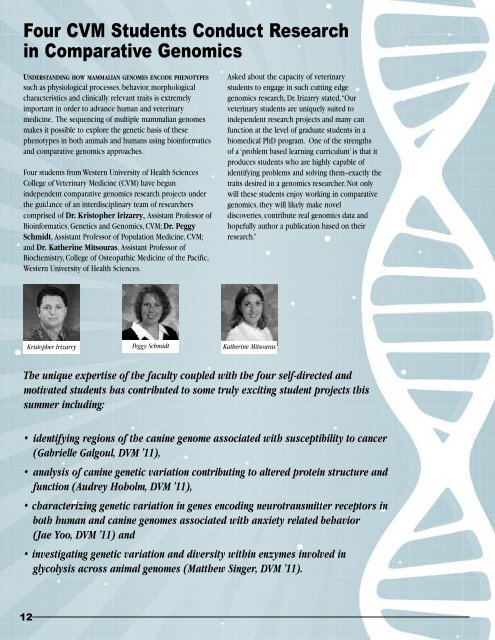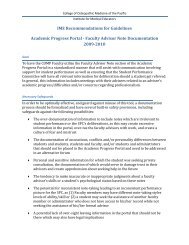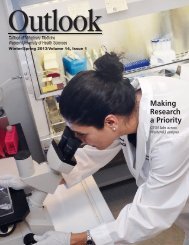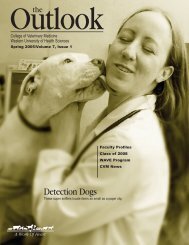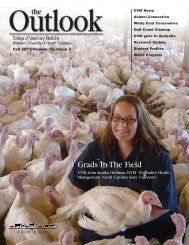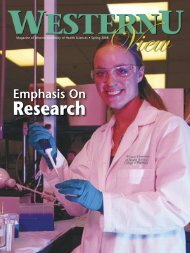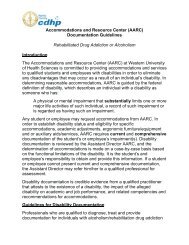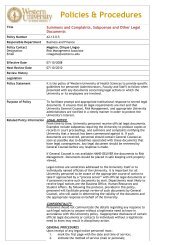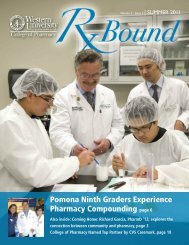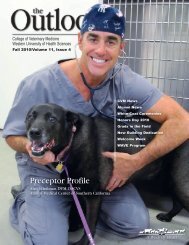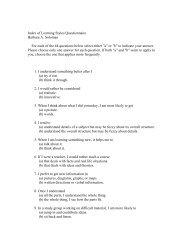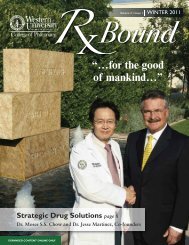Four CVM Students Conduct Research in Comparative Genomics UNDERSTANDING HOW MAMMALIAN GENOMES ENCODE PHENOTYPES such as physiological processes, behavior, morphological characteristics and clinically relevant traits is extremely important in order to advance human and veterinary medicine. The sequencing <strong>of</strong> multiple mammalian genomes makes it possible to explore the genetic basis <strong>of</strong> these phenotypes in both animals and humans using bioinformatics and comparative genomics approaches. Four students from <strong>Western</strong> <strong>University</strong> <strong>of</strong> <strong>Health</strong> <strong>Sciences</strong> <strong>College</strong> <strong>of</strong> <strong>Veterinary</strong> <strong>Medicine</strong> (CVM) have begun independent comparative genomics research projects under the guidance <strong>of</strong> an interdisciplinary team <strong>of</strong> researchers comprised <strong>of</strong> Dr. Kristopher Irizarry, Assistant Pr<strong>of</strong>essor <strong>of</strong> Bioinformatics, Genetics and Genomics, CVM; Dr. Peggy Schmidt, Assistant Pr<strong>of</strong>essor <strong>of</strong> Population <strong>Medicine</strong>, CVM; and Dr. Katherine Mitsouras, Assistant Pr<strong>of</strong>essor <strong>of</strong> Biochemistry, <strong>College</strong> <strong>of</strong> Osteopathic <strong>Medicine</strong> <strong>of</strong> the Pacific, <strong>Western</strong> <strong>University</strong> <strong>of</strong> <strong>Health</strong> <strong>Sciences</strong>. Asked about the capacity <strong>of</strong> veterinary students to engage in such cutting edge genomics research, Dr. Irizarry stated,“Our veterinary students are uniquely suited to independent research projects and many can function at the level <strong>of</strong> graduate students in a biomedical PhD program. One <strong>of</strong> the strengths <strong>of</strong> a ‘problem based learning curriculum’ is that it produces students who are highly capable <strong>of</strong> identifying problems and solving them–exactly the traits desired in a genomics researcher. Not only will these students enjoy working in comparative genomics, they will likely make novel discoveries, contribute real genomics data and hopefully author a publication based on their research.” Kristopher Irizarry Peggy Schmidt Katherine Mitsouras The unique expertise <strong>of</strong> the faculty coupled with the four self-directed and motivated students has contributed to some truly exciting student projects this summer including: • identifying regions <strong>of</strong> the canine genome associated with susceptibility to cancer (Gabrielle Galgoul, DVM ’11), • analysis <strong>of</strong> canine genetic variation contributing to altered protein structure and function (Audrey Hoholm, DVM ’11), • characterizing genetic variation in genes encoding neurotransmitter receptors in both human and canine genomes associated with anxiety related behavior (Jae Yoo, DVM ’11) and • investigating genetic variation and diversity within enzymes involved in glycolysis across animal genomes (Matthew Singer, DVM ’11). 12
Post Grad 2008 Plans NAME IMMEDIATE FUTURE PLAN 1) Emily Angell.......................Internship, VCA South Shore, Weymouth, MA 2) Alicia Bauchman ................Internship-<strong>University</strong> <strong>of</strong> Illinois-Food Animal <strong>Medicine</strong> 3) Jenny Bennett ...................Associate, Triangle <strong>Veterinary</strong> Hospital, Durham, NC 4) Colleen Brown...................Undecided at this time 5) Daisy Burns .......................Undecided at this time 6) Paula Capurro ...................Associate, small animal practice, Santa Rosa, CA 7) Kamaryn Casey.................Associate, Rose City <strong>Veterinary</strong> Hospital, Pasadena, CA 8) Liana Chang .......................Associate, Wegert Scholar, Banfield the Pet Hospital, Upland, CA 9) Michel Choi ........................Associate, Tustin Avenue <strong>Veterinary</strong> Hospital, Orange, CA 10) Shelby Costin ....................Internship, California <strong>Veterinary</strong> Specialists, San Marcos, CA 11) Tara Cotraneo....................Residency, Lab Animal <strong>Medicine</strong>, <strong>University</strong> <strong>of</strong> Michigan, Ann Arbor, MI 12) Danielle Desjardins...........Residency-Anatomic Pathology-Michigan State <strong>University</strong>, Lansing 13) Martha Diaz ......................Residency-UCLA-Lab Animal <strong>Medicine</strong> 14) Megan Dispenza ...............Associate, Wegert Scholar, Banfield the Pet Hospital, Mira Loma, CA 15) Heather Elliott...................Internship-Advanced <strong>Veterinary</strong> Care-Lawndale, CA 16) Cassandra Erickson...........Internship, VCA Albuquerque, NM 17) Kelly Everson ....................Undecided at this time 18) Ryan Folse.........................Undecided at this time 19) Carolyn Foster...................Associate, Banfield the Pet Hospital, Rancho Cordova, CA 20) Mitchell Fults.....................Internship, California <strong>Veterinary</strong> Specialists, San Marcos, CA 21) Nathan Fynaardt...............Internship, VCA Sacramento, CA 22) Eva Ganz............................Internship-Animal Specialty Group-Los Angeles 23) Mauricio Guaysamin.........Internship, VCA Hotel Circle, San Diego, CA 24) Janie Guirguis ...................Associate, small animal practice-Southern California 25) Miriam Harvey..................Associate, Wegert Scholar, Banfield the Pet Hospital, Fontana 26) Hiroko Hata.......................Internship, <strong>Veterinary</strong> Specialty Center <strong>of</strong> Tucson, AZ 27) Chrissy Heathcock ............Associate, Friendship Hospital for Animals, Washington D.C. 28) Cynthia Hervatic...............Internship-<strong>Veterinary</strong> Medical & Surgical Group-Ventura, CA 29) Stephen Hodgeson............Associate, small animal practice, Moreno Valley, CA 30) Daniel Jankovits ...............Internship, Animal Specialty Group, Los Angeles 31) Roxanna Khorzad.............Internship-Angell Memorial, Boston, MA 32) Terrance Krentz.................Internship-Bay Area <strong>Veterinary</strong> Specialists, San Leandro, CA 33) Sara Lee.............................Undecided, Avian practice, Bay Area, Northern California 34) Deena Leong......................Associate, small animal practice, Southern California 35) Dennis Loveless ................Undecided at this time-eventually, equine practice in Hawaii 36) Lucia Machine....................Associate, Brookswood <strong>Veterinary</strong> Hospital, Langley, BC, Canada 37) Genevieve Mak.................Internship, California Animal Hospital, Los Angeles, CA 38) Amy McGee.......................Associate, small animal/exotic practice-location unknown 39) Dana Miller........................Undecided at this time 40) Miranda Noseck................Internship, New England Equine Medical & Surgical Center, Dover, NH 41) Carolyn Olech ....................Associate, small animal practice, Northern Virginia, 42) Jeremy O’Neil...................Internship, Red Bank <strong>Veterinary</strong> Hospital, Tinton Falls, NJ NAME IMMEDIATE FUTURE PLAN 43) Alayson Phelps .................Internship, Angell Memorial, Boston, MA 44) Jill Pindar...........................Internship, Encina <strong>Veterinary</strong> Hospital, Walnut Creek, CA 45) Beth Pintzow ....................Associate, Rolling Hills Animal Hospital, Rolling Hills, CA 46) Mia Provost ......................Undecided at this time 47) David Robertson...............Internship, equine theriogenolog, Arizona 48) Kelly Robertson ................Associate, mixed practice, Jackson County Animal Clinic, Seymour, IN 49) Erika Roldan......................Internship-Bay Area <strong>Veterinary</strong> Specialists, San Leandro, CA 50) Sarah Sacco .......................Internship, VCA West LA, Los Angeles, CA 51) Julia Schoellenbach ...........Undecided at this time-will be in the Temecula area, CA 52) Jennifer Schmigdal............Associate, Banfield the Pet Hospital, Ontario, CA 53) Gregory Shukhman...........Associate, Banfield Charter Hospital, San Bernardino, CA 54) Jesse Sinkowski................Undecided, equine practice-Pacific Northwest 55) Mary Siri............................Undecided, small animal practice, Santa Cruz, CA 56) Meg Sislak.........................Internship-Equine practice, Virginia 57) Andrea Smith ....................Associate, small animal practice, Sherman Oaks, CA 58) Crystal Souza....................Associate, equine practice, Goldsby, OK 59) Sara Stoll...........................Undecided at this time 60) Lauren Swank ...................Associate, mixed practice, Cervids/exotic ho<strong>of</strong>stock, LA 61) Colleen Tansey ..................Internship, So. California <strong>Veterinary</strong> Referral Group, Irvine, CA 62) Melissa Thompson ............Associate, Wegert Scholar, Banfield, the Pet Hospital, Fontana 63) Laura Tucker ......................Associate, Cheshire Cat Hospital, Westminster, CO 64) Naomi Urbina ....................Associate, Banfield the Pet Hospital, San Diego, CA 65) Sarah Vineyard.................Undecided, small animal practice, San Diego, CA 66) Ann Vitti ............................Undecided, small animal practice, Southern California 67) Kristin Wakamatsu...........Internship, So. California <strong>Veterinary</strong> Referral Group, Irvine, CA 68) Sarah Whitol .....................Internship, VCA Sacramento, CA 69) Jonathan Williams ............Associate, small animal practice, Portland, OR 70) Connie Wu..........................Internship, So. California <strong>Veterinary</strong> Referral Group, Irvine, CA 71) Tracy Yen ...........................Internship, VCA West LA, Los Angeles, CA Summary Associates.....................18/71 = 24% Banfield .........................8/71 = 11% Internships...................28/71 = 42% Residencies ....................3/71 = 4% Undecided ....................14/71 = 18% 13


